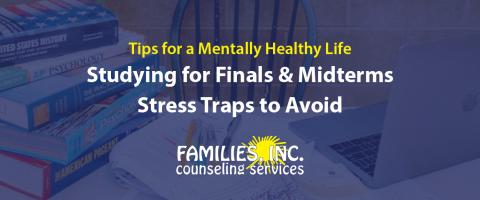
Studying for finals, midterms, and even regular tests can be inherently linked with stress. In fact, where stress is already built into a situation where you need to call up all the important information that you've learned in each of several classes over the course of several months, the last thing students need to do is add to the stress of important tests, midterms and finals, right? Well, unfortunately, many students inadvertently do just that. Certain common practices that often make finals and other tests even more stressful than they need to be. Do any of these sound familiar?
Pulling "All-Nighters"
Many students -- especially those who work best with deadlines -- find themselves staying up all night studying. Going through the next day exhausted, many may wonder if it's worth it -- do the benefits of an all-night study session outweigh the sleepiness and fuzzy thinking that generally characterize the next day? Recent research says 'no.' A study published in the Behavioral Sleep Medicine found that students who regularly pulled all-nighters tended to have lower GPAs than those who didn't. The study also found that most students didn't stay up all night studying because they had to. They did it because it was 'kind of fun,' or a rite of passage. This is good news because it means that most students, armed with the understanding that all-nighters aren't associated with higher grades, can stop.
Powering Down the Caffeine
Decades ago, truck drivers and students in the throes of finals season might consider taking caffeine pills or powering down the Mountain Dew to stay awake when they wanted to be up all night. More recently, many 'energy drinks' have sprung up on the market, and are gaining popularity with students who want to have extra energy for extra studying. While energy drinks may be tempting, and some evidence shows that they can enhance performance in the short term (especially for those who aren't habitual consumers), there are drawbacks as well. Caffeine can give your energy level a temporary jolt, but that can be accompanied by a later crash that leaves you feeling completely drained. Studies show that students who consumed energy drinks may also experience headaches or even heart palpitations. Also, caffeine stays in your system for many hours longer than you may expect, which can interfere with sleep, making it difficult to sleep when you need to. This can leave you exhausted rather than refreshed in the morning, and potentially causing a self-perpetuating cycle. Find- ing natural ways to get extra energy, such as a healthy diet and exercise, as well as quality sleep on a regular basis, is the best way to maintain enough energy to tackle finals.
Having Study Parties with Your Fun Friends
While it seems like a great idea to get together and study with your friends, if you're not careful you may find yourself wasting valuable study time accomplishing nothing but some muted fun. With the wrong mix of people, group studying can turn into a gossip session. Even meeting in the wrong place, such as a busy restaurant or worse -- a dorm room -- can offer enough distraction to sabotage your efforts. It's best to stick with the library or another quiet place that presents the right atmosphere and is conducive to studying. Study groups can be wonderfully successful, but be sure to think long and hard before organizing one. Choose people who are responsible and committed, and be sure that you maintain the same level of commitment to studying. You can all celebrate your good grades when finals are over.
Waiting Until The Last Minute and Going On Adrenaline
While many people swear by this method, it's an obvious risk if you really think about it. First, you always run the risk of not finishing in time, and being unprepared. Second, you greatly increase your chances of needing to try some of the other items on this list, such as powering down the caffeine or pulling all-nighters. Finally, adrenaline and hasty 'cramming' tend to encode information into your short-term memory, but the knowledge doesn't always remain memorized; you cheat yourself out of a true education. (And you may want to build on this knowledge later, rather than having to re-learn it at some future date.) A wiser choice for those who work best with deadlines is to give yourself a deadline that's really a week or so before your 'real' deadline -- this gives you a burst of motivation, but also some wiggle room.
Constantly Reminding Yourself What's At Stake
While remembering the importance of a test's outcome can be a good motivator for studying, too much focus on the outcome can backfire. If you're the type of person who is already pretty conscientious, and the idea of doing poorly on the test is starting to cause significant test anxiety, it may be time to shift your focus. This is because being overly anxious about a test's outcome can actually cause you to do poorly, or to score lower than you normally would. To avoid obsessing, try some positive affirmations, visualizations, or tips from this article on overcoming test anxiety.


